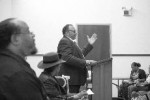
Arthur Lee Ford Jr., from Plain Dealin recently reviewed “When the Whippoorwill Sang: A Memoir of Rural Life during the Twilight of the Segregated South” in the Grambling Hall Auditorium.The program began with greetings from Dr. Robert Dixon, provost and vice president of Academic Affairs and Kari Davis, president of Carter G. Woodson History Club. Following Davis and Dr. Dixon was Greg Mouton, sales and marketing representative of the Center for Louisiana Studies.
Mouton gave a brief history regarding the University of Louisiana Press (U of L Press), which was founded in 1973. The U of L Press gave Ford an opportunity to publish his book. Next, James Wilson gave the introduction of the guest for the day, Author Lee Ford.
Ford was very professional for his review and did not have his audience waiting. Although in business attire, Ford put everyone to ease and told them to be informal. While Ford said he was good at remembering past events, he isn’t good at remembering a speech, so he spoke from the heart.
Ford began his presentation by giving a brief history about his early life; how he grew up during the days of Jim Crow, shotgun houses, and racial segregation. After high school, Ford got on, as he would say, the first thing “smoking” out of Plain Dealing and moved to Northwest Bossier Parish.
During the era while Ford was young, the cotton and timber industries were blooming. He then went into detail how there were long work days, sometimes even having to wake up at 3 o’clock in the morning. The workdays started at sunrise and didn’t end until sundown. While Ford was outside wither picking or chopping cotton, he said he could hear a bird passing through the tall pine trees- consequently this is how he heard the whippoorwill singing to him.
While living in the South picking cotton on a daily basis, he was able to see the faces and hear the voices of so many people that worked from dusk till dawn. Ford wrote his memoir because he wanted to show recognition to the people of the state of Louisiana, but most importantly Bossier Parish as a whole. He felt it was significant to give credit to our ancestors for all the hard work and strenuous labor they endured for so many years.
Following his synopsis was a question and answer period. In his opinion, Ford felt reparations should be given out to those who endured slavery and it should be based on the length of slavery period and how much labor was done.
An audience member asked Ford if he had plans on writing another book and he responded, “Yes. I plan on drawing comments from the first book.”
The question “How can you encourage young people not to be enslaved by today’s society?” was asked and Ford answered, “Study your history. It will not repeat itself if you know it.”
Following the question and answer session closing remarks was given by Dr. Roshunda Belton, head of the Department of History.
